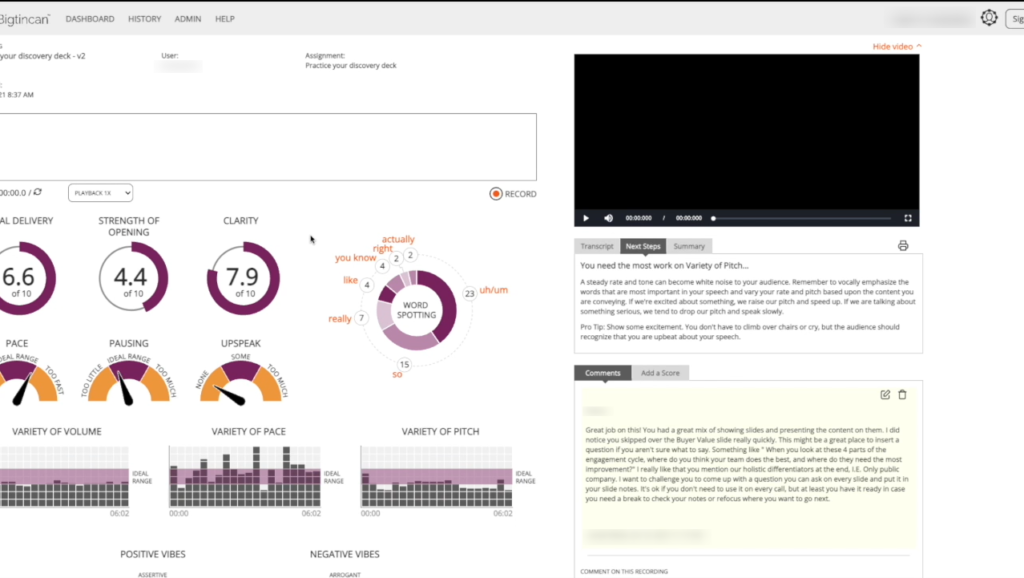How to use conversation intelligence in sales? Make it a built-in mentor, not Big Brother
Machine learning technology that records and evaluates conversations has become a regular feature of sales enablement. According to Gartner, over half of B2B sales companies will be recording 75% or more of their conversations with buyers by 2025 — but many organizations still don’t know how to use conversation intelligence in sales the right way.
Conversation intelligence (CI), allows sellers (and other customer-facing reps) to reflect on their own performance, analyze customer responses, and improve communication skills. When used correctly, conversation intelligence becomes a scalable built-in coach that provides the kind of timely and constructive feedback busy sales managers aren’t able to consistently deliver.
But there’s one inherent obstacle to implementing these tools – getting sales reps to regularly record themselves and submit those recordings for evaluation. Understandably, some sales reps can be uncomfortable with this process. If we’re being honest, it can feel a bit like Big Brother — especially if sales leadership hasn’t made the true function and benefits clear from the beginning.
Because CI itself is not the problem, but how it’s used. The real intention behind these systems is to improve performance by empowering sales reps to continuously learn and hone their skills to the benefit of themselves, their employers, and their customers.
It’s leadership’s job to make these intentions clear.
So how can managers use conversation intelligence in the correct way to encourage seller adoption? By understanding how and why it works and emphasizing the benefits — which we dive into below.
Keep reading to learn how conversation intelligence works and how it benefits your team or get a demo to see it in action.
How does conversation intelligence work?
Conversation intelligence is a subset of artificial intelligence that combines natural language processing (NLP) and machine learning to provide in-depth assessments of and insights into human conversations. This is especially valuable in the context of sales enablement, as sales reps are heavily reliant on their conversation abilities to educate and guide their potential customers.

This particular branch of AI helps answer a variety of important questions pertaining to client needs while also reducing the workload on managers. The process broadly consists of two main steps:
- Input analysis
- Response generation
Input analysis involves determining the meaning behind what is said in a conversation.
Response generation crafts suggestions for responses based on previous assessments. For example, a chat-based system powered by conversation intelligence might suggest relevant responses that sales reps can select from, rather than having to type them out manually every time.
The process relies heavily on machine learning to enable continuous improvement. The more conversations that are recorded and analyzed, the more effective and accurate the proposed responses become. In other words, it is a process of continuous training, in which the algorithm gets smarter every time based on past successes and failures. As such, it offers a real-time coaching assistant to sales reps.
With that in mind, here are some ways conversation intelligence can serve as a built-in mentor for your sales reps.
The benefits of conversation intelligence
1. Encourage professional development
Conversation intelligence algorithms can analyze massive unstructured data sets at scale to take much of the guesswork out of customer service. In the context of sales enablement, this means using AI to provide suggestions during or after conversations with customers.
Sales reps can also learn from these insights to constantly improve their communication skills. They can see how often they listen rather than speak or use filler words. Some CI tools can even detect a speaker’s vibes and provide coaching on sales rep demeanor and attitude to improve customer experience in future conversations.
Using conversation intelligence can greatly simplify coaching and onboarding for sales reps. Instead of needing constant and careful instruction, sales reps will effectively have their own built-in mentors that decrease the time it takes to attain peak productivity. Furthermore, even the most experienced and accomplished among sales reps will find that there is always room for improvement, hence how conversation intelligence can also assist with career growth.
2. Free up time for sales managers
Repeatable routine processes can and should be automated, and that holds true for the conversations between sales reps and their customers. At the same time, it is vital to retain the human element, especially in an era when so many customer interactions are automated.
Conversation intelligence balances automation and human interaction by creating a knowledge base of recorded conversations and automating feedback to improve them in the future.
For sales managers, this means less time spent on training and evaluating the performance of sales reps. Leveraging conversation intelligence in the right way can also placate the fears of Big Brother, since it will rarely be necessary for sales managers to listen in or get directly involved in ongoing calls. Instead, they can focus their efforts on high-level training or handling issues that can’t be handled by anyone else.
3. Track and validate staff performance
Recording calls between sales reps and their customers has long been a standard practice in sales departments for improving training and development. In the past, managers would have to spend hours listening to these recordings to evaluate staff performance.
Conversation intelligence makes the entire process far more efficient through automation, especially at the scale of the modern call center.
Even more importantly, it provides an easy and accessible way for managers to validate the performance of their sales reps. Line managers can use these insights to support requests for raises and promotions. Instead of taking the time to exhaustively evaluate sales reps manually, they can instantly identify who the best (and worst) performers are and hone in on any skill gaps in their teams.
4. Facilitate closer team collaboration
The ability to quickly identify skill gaps and opportunities through conversation intelligence also fosters a culture of transparency and collaboration. Moreover, this can extend beyond the sales department to other mission-critical areas, such as marketing and customer support.
For example, marketing teams can also use the insights delivered by conversation intelligence to identify gaps in their own messaging and, in doing so, achieve closer alignment with sales.
By analyzing what works and what doesn’t, conversation intelligence can help make sense of vast troves of recorded phone conversations, emails, and other customer communications.
When a lead becomes a paying customer, sales reps and other teams can immediately identify the key talking points that ultimately led to that transition. In other words, AI helps continuously improve the way that customer-facing teams talk about their products and services.
5. Gain valuable insights into customers
Conversation intelligence goes far beyond simplifying onboarding and training of your sales reps. It also gives you the opportunity to learn more about your customers and what makes them tick.
By analyzing what customers say and how they sound on phone calls, businesses can maintain a complete record of customer questions, concerns, and pain points. Recurring instances of these talking points are then fed back into the algorithm to improve the insights and suggestions it delivers.
The opportunity to learn more about customers and their unique needs is one of the main use cases behind the increasing adoption of conversation intelligence.
The most advanced tools even go so far as to catch the vibes that a customer gives off during a conversation, such as awkwardness, confusion, or excitement. If, for example, customers often respond uneasily to a particular question that sales reps routinely ask, then you’ll know about it instantly and have the opportunity to tailor your messaging accordingly.
6. Build a constantly evolving and winning sales playbook
Deploying conversation intelligence in sales and marketing communications is not meant to be a quick fix or even a specific endpoint. Rather, it’s about achieving continuous improvement at a speed and scale that simply isn’t possible when relying on manual means alone. As is the case with any machine learning solution, the system learns by doing to deliver more relevant and accurate answers every time.
Applying machine learning over the course of your sales conversations allows you to build a dynamic and winning playbook for onboarding and developing sales reps and identifying what works and what doesn’t.
By translating huge amounts of verbal and written communications into actionable insights, you can analyze trends, competitor mentions, objections, talking patterns, feature requests, and much more to iteratively improve your sales enablement operations.
How to use conversation intelligence in sales correctly - the bottom line
The most effective sales reps are those who know not only how to close a sale, but also how to keep people happy once they become paying customers. Conversation intelligence helps sales teams achieve both of these goals by automating the monitoring and analysis of every conversation with potential or existing customers. As a result, reps develop a more nuanced and deeper understanding of their target audiences and continuously improve their skills.
In today’s highly competitive world, where timeliness and making an excellent first impression are everything, the benefits of conversation intelligence are undeniable.
By making customer experience the focus of conversation intelligence and fostering seller skills to improve it, sales leadership can make Big Brother feel less Orwellian and more like a mentor.
Bigtincan is a global leader in sales enablement automation. We offer solutions for the retail, manufacturing, and life sciences sectors, among others. Request your demo today to see how conversation intelligence and other automation tools can improve efficiency at your organization.
